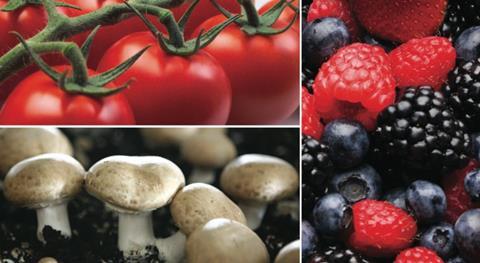Leading Australian fresh produce company posts “creditable” performance in the face of difficult weather conditions.
Costa Group has released its full-year (12 months to 1 January 2023 (CY22)) results, posting what it said was a “creditable” performance.

The group’s revenue grew 11.2 per cent year-on-year (yoy) to A$1.3bn. However, its EBITDA-S dropped 1.6 per cent yoy to $214.8m, its NPAT-S dropped 50 per cent yoy to A$30.2m and its Statutory NPAT dropped 9.9 per cent yoy to A$47.0m.
“Costa’s creditable performance reflects the importance of our investment in protected cropping and premium varieties, especially given the challenging weather conditions which impacted the fresh produce industry over a large part of 2022,” said interim Costa Group chief executive, Harry Debney.
“Our protected cropping assets across berries, mushrooms and tomatoes saw continued earnings improvements supported by favourable pricing. Our recent capital expenditure is also delivering, as is evidenced by our Monarto mushroom facility exceeding weekly production capacity through the entire year, and new 10ha of tomato glasshouse and state-of-the-art nursery, delivering additional expected yield and building on our market leading positions.
“Given the strong increase in yield in our citrus category and favourable export pricing and demand, it was disappointing that adverse weather across our three citrus growing regions ultimately impacted quality to an extent which resulted in earnings that were well below plan.”
The performance of Costa’s international segment was one highlight, particularly in China where “excellent product quality, demand and pricing underpinned performance”, according to the companny. Volumes from its China business continue to increase as its production area expands, with 400ha of blueberries currently planted in China and a target of 700ha in 2026 approved by the board.
Debney said the company expects weather conditions to improve in 2023 and a return to more normal growing conditions that will deliver improved performance. Costa also highlighted the need for the Australian government to take action on export market access with opportunities on offer in a range of markets.
“It is very pleasing to see the Albanese government committed to revitalising Australia’s relationship with China and Costa looks to this continuing over the coming months and years. It is vital to both re-starting and progressing export market access negotiations, most notably access for blueberries, which were disappointingly stalled under the previous federal government,” said Debney.
“Over the past decade while the industry has been waiting for access to the China market for Australian grown blueberries, six other competing countries have secured access, namely Chile, Canada, Peru, Argentina, Mexico and the United States. Also, during this time Australia negotiated a Free Trade Agreement with China, yet was still unable to gain access.
“The government’s positive relations with Vietnam will also help to develop further market access opportunities, with Vietnam proving to be an important market for our table grape exports and hopefully blueberries in the years to come.
“More effort needs to be put into opening up market access to Japan, which despite the strong relationship between the two countries, is another important market for fresh produce which has not been fully developed over recent years.”
Looking to the 2023 calendar year, Costa anticipates a recovery in its citrus category performance this year, which will also be enhanced by maturing orchards in Central Queensland and Sunraysia, Victoria. It will also focus on yield, quality and further premium product roll outs to offset input cost inflation.



